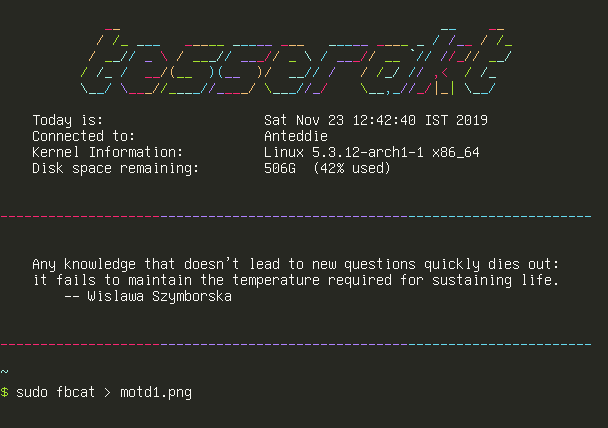A Message of the Day (MOTD) is a piece of text that is displayed when you log in to your computer. If you’ve ever SSHed into a Raspberry Pi or a VPS, you’ll have noticed some text being displayed right after you log in – a copyright notice, a disclaimer, the amount of unread mail you have, etc.
By default, a MOTD is static – the login program just prints out the contents
of /etc/motd. That gets boring pretty soon, though. So I wrote a dynamic MOTD
for myself – its contents change on every login. It’s created by a script I
wrote called motdmaker and stuck in /usr/bin/.
Here’s what it looks like:

And here’s the code for motdmaker (GitLab
snippet featured in this post; updated GitLab project).
I spent a good half hour on this, so let me explain a couple of the less-immediately-obvious lines.
-
/opt/monokaicontains escape codes that set my TTY colour scheme. I snagged it from pywal – it creates a file for your preferred colour scheme,~/.cache/wal/colors-tty.sh, and you cansourcethis to set your TTY colours. -
Toilet (lol):
toilet -k -f slant -F rainbow "$(hostname)" | sed 's/^.*$/\t &/'
`toilet` makes my hostname look like that. Poking around in `man toilet` yields
a few interesting options, so make sure to play around with it. (Pun intended!)
sed is the venerable stream editor, and here it prefixes each line from
toilet’s output with a tab and two spaces.
- Disk usage:
echo " Disk space remaining:\t" `df -h | grep sda2 | awk '{print $4}'` " ("`df -h | grep sda2 | awk '{print $5}'`" used)"
`df` shows you your disk usage. Typically, its output (with the human-readable
flag -h) is something like:
Filesystem Size Used Avail Use% Mounted on
dev 3.9G 0 3.9G 0% /dev
run 3.9G 936K 3.9G 1% /run
/dev/sda2 916G 358G 511G 42% /
tmpfs 3.9G 73M 3.8G 2% /dev/shm
tmpfs 3.9G 0 3.9G 0% /sys/fs/cgroup
tmpfs 3.9G 2.6M 3.9G 1% /tmp
/dev/sda1 511M 6.3M 505M 2% /efi
tmpfs 784M 16K 784M 1% /run/user/1000
tmpfs 784M 0 784M 0% /run/user/1001
My primary disk is /dev/sda2, so I’m grepping that (extracting the line that
contains “sda2”), and getting the fourth and fifth words using awk, to print
the amount of free space and the percentage occupied.
- Network info:
echo "\n Connected to:\t\t" `iwconfig wlp2s0 | head -n 1 | sed 's/"/ /g' | awk '{print $5}'` >> $motd
wlp2s0 is my wireless interface; this prints the SSID of the network I’m
connected to. head -n 1 gets the first line. sed 's/"/ /g' gets rid of the
quotation marks. awk '{print $5}' gets the fifth word.
- Quote:
shuf -n 1 /opt/quotes.md | sed 's/ --- /\n\t-- /g' | fmt -w 70 -u | sed 's/^.*$/ &/'
I’m particularly proud of this one. shuf -n 1 gets one random line from /opt/quotes.md.
That file has a few dozen quotes, formatted like so:
A rock pile ceases to be a rock pile the moment a single man contemplates it, bearing within him the image of a cathedral. --- Antoine de Saint Exupéry
Without courage we cannot practice any other virtue with consistency. We can't be kind, true, merciful, generous, or honest. --- Maya Angelou
First, sed splits the line at the em-dash, and puts the attribution on a new line,
prefixed by a tab and an en-dash. fmt formats the quote to 70 characters a
line, splitting the lines at spaces, and applies uniform spacing (one space
after words, two after periods). Finally, we use sed to prefix each line with
four spaces.
colouredlinecontains a line that I passed throughlolcatand captured withscript. It’s just more fun than a regular old linebreak. To get a coloured line of your own, run:
$ script colouredline
$ echo "---------------------------------" | lolcat
$ # make the line as long/short as you want
$ # hit Ctrl-D to exit script
$ vim colouredline # remove a couple of lines at the top & bottom
$ cat colouredline
$ # voilà!
Neat, isn’t it?
Usually, a MOTD is read from /etc/motd. However, I had problems with
permissions when I tried to edit motdmaker to write to it at boot, so I’m
using /opt/motd instead. I call motdmaker at the end of my /etc/profile
like so:
if [[ ! $TMUX ]]; then
/usr/bin/motdmaker
cat /opt/motd
fi
With the not-tmux flag, my MOTD is printed when logging in at the TTY and
through SSH. And it works for every user, as all the files I’m using here are in
/opt/ and have their permissions set to 777 (chmod 777 /opt/file).
So to replicate this set-up, you’ll have to:
- create
/usr/bin/motdmakerand make it an executable (chmod +x /usr/bin/motdmaker) - play around with
toilet,figlet,lolcat, andpywal - modify the lines for disk space & SSID to match your system setup
- make a coloured line and store it in /opt/
- compile a quote file for yourself in /opt/ (or just use
fortune) - modify the permissions for all these files appropriately
- modify your
/etc/profile.
I’m enjoying my new MOTD very much! If you try this out, send me a picture of what you come up with – I’d love to see.
References: